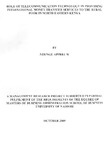| dc.description.abstract | Growing internationalization and opportunity in financial services has entirely changed the
competitive landscape, as now many banks have demonstrated a preference for the "universal
banking" model so prevalent in Europe. Universal banks are free to engage in all forms of
financial services, make investments in client companies, and function as much as possible as
a "one-stop" supplier of both retail and wholesale financial services. However, structural
weaknesses in the financial industry in Kenya, limit the access to money transfer services,
especially in rural areas and for low-income people. This is because banks are concentrated
mainly in urban centers and have conditions that constitute barriers to the use of their
services. This is has affected money transfers to North Eastern province
North Eastern Province is one of the eight administrative provinces in Kenya with a total
population of about 1 million people (1999 Population census) covering an area of 126,902
square kilometres. A large percentage of this population considered poor lives on less than 1
US$ a day given the harsh climatic and economic conditions in the areas. Currently, there are
a number of local, national and international organisations that provide financial service to
the marginalised area of North Eastern Kenya. However, recent developments in technology
tend to have changed the way in which money can be transferred to individual persons in the
remote areas of North Eastern Province.
It is out of this that this study focuses on determining the modes used and role of technology
in making international money transfers to the North Eastern province of Kenya that is
argued to be poorly served with infrastructure. The objectives of the study were to determine
the modes of Money Transfer Systems to the rural poor in North Eastern Kenya, establish the
role of technology in International Money transfer services to Northern Kenya and establish
the challenges organisations engaged in the International Money Transfer Payments in North
Eastern Kenya are facing.
This study was aimed at being of importance to the financial institutions in Kenya"
international Organisations involved in development initiatives, The Government of Kenya,
Scholars and Researchers. | en |

